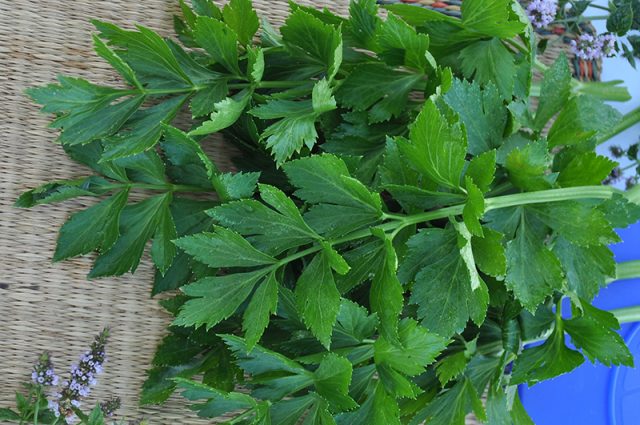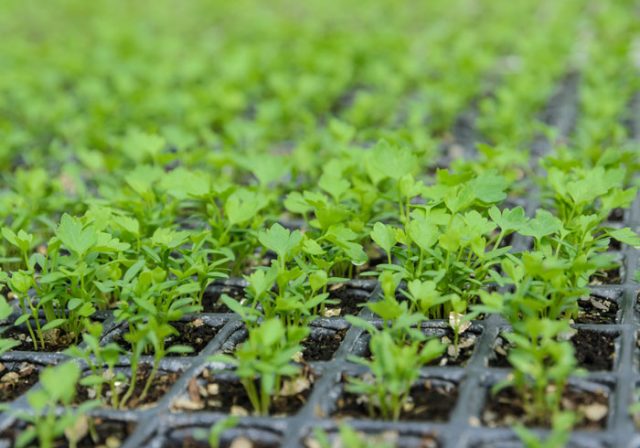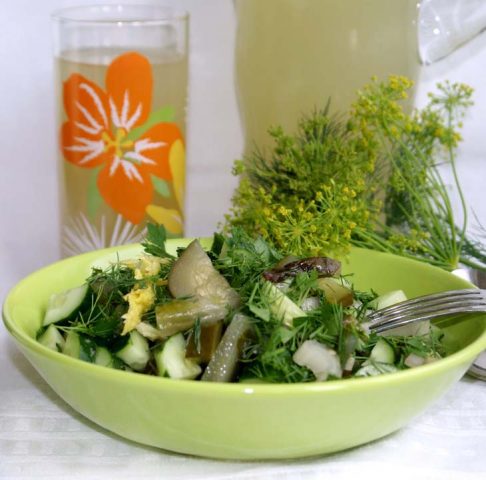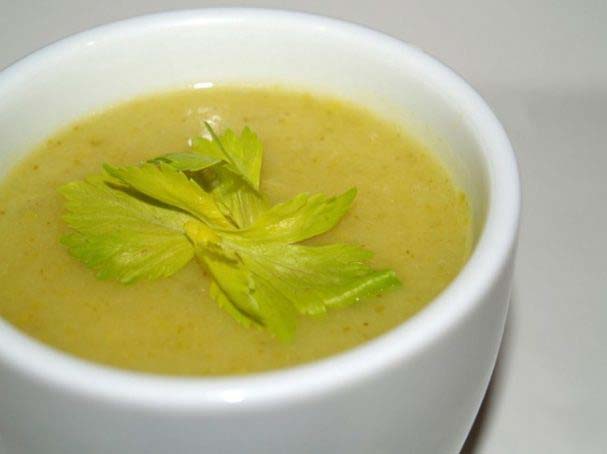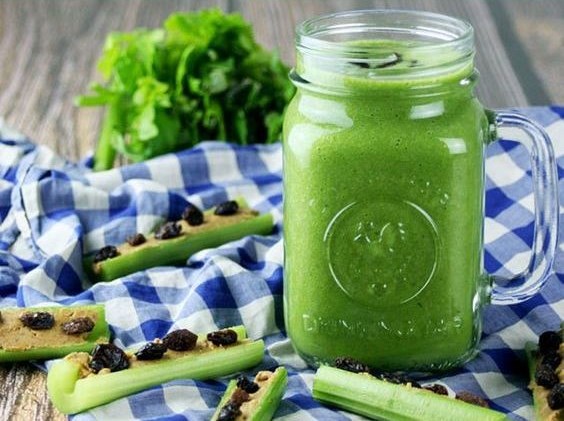Content
Some resourceful agronomists know about a rare crop - leaf celery, which is planted in boxes in early March in order to introduce one of the most useful plants into the diet during the year. The benefits and harms of leaf celery should be known to everyone.
What does leaf celery look like?
Unlike the two types of celery, root and petiole, leaf celery produces a large volume of leaves. At the same time, his root is thin, growing deeply into the ground. The leaves grow from the outlet. This is the structure of the leaves, when their base is closely intertwined with each other and resembles a bush. The leaves are the edible part of celery, visually resemble parsley, they are the same fluffy, have the same density, color and arrangement on the leg, only differ in smell and taste.
Other features, the height and number of leaves on the rosette, depend on the variety. For example, the Samurai variety grows up to 65 cm and has a fluffy bouquet of leaves, while the Zakhar variety, on the contrary, has a height of up to 36 cm and less leaves, but it ripens faster. Variety "Local" also grows up to 65 cm, but its density cannot be compared with any other, from 1 m² you can harvest 3 kg of crop.
Leafy celery - annual or perennial
Since the leafy version of celery has a small root, the plant lives for only 1 year. The next year, it is necessary to again plant the seedlings on the windowsill and transplant them into the ground a month later. Other types of celery are grown for the root, so they are pulled out completely, leaving nothing in the ground. There is only 1 type of this plant, which is planted once for 10-15 years. It is called Lovage, he is also the Piper, or Zorya.
Do celery leaves eat
Celery leaves are eaten as a separate product. It is added and prepared in a variety of ways. Dried for the winter, grind in a blender, drink in the form of juice, bake pies, freeze, add to conservation, make smoothies. There are many recipes for preserving and preparing these aromatic greens. The most common use of the leafy product is slicing it into a vegetable salad.
Health benefits and harms of leaf celery
Any greens are popularly considered a useful product. Leaf celery, on the other hand, is known for its tonic properties and positive effects on the male body. With adenoma and impotence, special healthy recipes are prepared from honey and other fruits mixed with juice from celery leaves. Daily use of these recipes does not bring any harm.
When losing weight, juicing from leaf celery and other fruits and vegetables is very popular. Due to the minimum calorie content and the rich content of useful elements, such drinks give strength for the whole day, removing toxins from the body with the help of the fiber that is part of the plant.
Celery leaves are high in sodium. Due to its ability to remove excess fluid from the body, it is not harmful to people with hypertension. The plant is also known for its ability to eliminate cholesterol from arteries and blood vessels, which is also necessary for those suffering from high blood pressure.
Various herbs, including celery leaves, purify the blood and enrich it with oxygen, as a result of which it increases vigor and a surge of energy. Therefore, the greens of this plant are used with low hemoglobin.
You can get harm if you consume the product a lot and every day. Frequent intake of celery juices on an empty stomach increases acidity and leads to gastritis. Taking greens for medicinal purposes, when it is important to take it on an empty stomach, it should be drunk no more than three tablespoons at a time. Otherwise, it all depends on individual intolerance, the presence of chronic diseases and allergies.
Celery leaf composition
Celery leaves contain a wide range of vitamins, making it one of the healthiest foods around, along with nuts and legumes. It is for this reason that this plant is prized among vegetarians who prefer live food. Chemicals found in foliage and stem include:
- potassium;
- calcium;
- iron;
- sodium;
- phosphorus;
- magnesium;
- purine.
Leaf celery has essential oils, oxalic and chlorogenic acids, vitamins B, C, E, A and beta-carotenes. The nutritional value of the product per 100 g is 13 kcal, including 0.9 g of protein, 0.1 g of fat, 2.1 g of carbohydrates.
How to eat celery leaves
The product is effective raw. It must be remembered that heat treatment, cooking, baking reduces the amount of useful elements. Celery can be dried and frozen for the winter. The culture has a lot of vitamin C, which is necessary for the immune system and blood vessels. 100 g of the product compensate for the daily requirement of vitamin C, beta-carotene and vitamin A.
The beneficial properties of leaf celery include essential oils that stimulate the nervous system. Therefore, it is useful to eat it in the morning to invigorate, unlike coffee, which is contraindicated for people who have pressure drops during the day.
In case of constipation, it is necessary to drink celery juice diluted with water 1:10. Its firming effect is beneficial even for nursing mothers whose babies suffer from poor bowel movements. With mother's milk, the baby will receive the diluting elements of this vegetable crop.
It is good to drink celery juice before meals because it stimulates the appetite. Taking culture before meals has a beneficial effect on the kidneys during the inflammatory process and reduces pain from cramps during menstruation.
Leaves, ground with honey, are taken for prostate disease. This recipe is made with equal parts honey and celery, which must be taken 2 tablespoons three times a day. Store the product in the refrigerator.
Healthy and delicious recipes
Leafy celery is a malleable plant and goes well with almost all foods except sweets. Sprinkle with herbs any soup or vegetable salad. There are a few simple leaf celery recipes worth considering that you can cook every day.
Tortillas with celery
This original Armenian dish is very low in calories due to the presence of herbs and spices as the main ingredients. It can be prepared in 1 hour, the preparation time will take 40 minutes.
Ingredients:
- 400 g flour;
- 1 glass of water;
- 120 g celery leaves;
- 120 g cilantro;
- 100 g green onions;
- 100 g of garlic feathers;
- 100 g of salad;
- 80 g spinach;
- 80 g sorrel;
- 50 g dill;
- 80 g of vegetable oil;
- salt and pepper to taste.
Cooking method:
- Mix flour, water, salt, make a thick dough, cover with foil and let stand for 30 minutes.
- Chop all the greens or grind in a blender, salt and pepper.
- Cut the dough into 6 equal parts, roll out to a thickness of 1 mm.
- Fill with herbs and mold into pies.
- Fry the cakes in a pan until the dough is ready.
You can also include dandelion leaves, radish and beet tops, nettle in the set of greens.
Banana salad with apples and celery
This lean, high-calorie dish can be cooked in 15 minutes. All products remain fresh and cannot be cooked. During the summer months, it is a quick snack with a minimum of effort.
Ingredients:
- bananas;
- apples;
- tomatoes;
- celery leaves;
- ground pepper;
- salad;
- mayonnaise.
Cooking method:
- Cut the bananas lengthwise into two without damaging the peel (it will serve as a plate).
- Finely chop the lettuce, tomatoes and apples, season with mayonnaise, mix.
- Spread on banana.
The dish is ready.
Summer salad kvass from greens
This dietary Jewish salad is low in calories and rich in vitamins - just what you need for dieters. All components are used fresh, which can be added in unlimited quantities. The salad can be eaten and drunk.
Ingredients:
- salad;
- celery leaves;
- parsley with dill;
- cucumber;
- Apple;
- horseradish leaf, currant and cherry;
- 2 cloves of garlic;
- basil;
- sugar and salt.
Cooking method:
- Cut greens and vegetables not very finely.
- Put everything in a three-liter jar, leaving about half a liter of free space.
- Add salt and sugar 1 teaspoon each.
- Pour warm water and cover with gauze, leave to ferment for a day.
- After the allotted time, drain the kvass separately, discard the inedible leaves, chop the edible leaves finely.
Serve chilled as okroshka or salad. Any greens can be added, for example, cilantro, green onions, spinach.
Diet celery soup
This recipe is included in the Weight Loss Kit. Cooking together with the preparation of the ingredients will take half an hour. The soup contains products with cleansing properties, so their combination is useful for people who are in rehabilitation after surgery.
Ingredients:
- 1 bunch of celery leaves along with the stem;
- 1 medium white cabbage swing;
- 5 tomatoes;
- 2 bell peppers;
- 3 onions;
- 1.5 liters of water;
- salt to taste.
Cooking method:
- Chop pieces of celery, bell pepper and onion at random.
- Peel the cabbage, remove the tough part of the roach, chop the leaves.
- Peel the tomatoes by dipping them in boiling water for a minute.
- Mix all vegetables, add salt to taste and simmer for 25 minutes.
Serve the soup hot. You can also make a puree soup from it. To do this, cook the vegetables whole, then remove them from the broth, pass through a blender and pour the broth over again.
Green smoothie with apple and pineapple
This dietary drink, rich in plant carbohydrates, can wake up the body in the morning and give it strength until lunchtime. The calorie content of one serving is 318 kcal, 4 g of which are proteins, 13 g for fats and 48 g for carbohydrates. It can be cooked in 15 minutes.
Ingredients:
- 2 green apples;
- stalk and leaves of celery;
- 1 small cucumber;
- half a pineapple;
- half an avocado;
- 50 g spinach;
- a quarter of lime;
- 150 g ice.
Cooking method:
- Cut the cucumber, apple, celery and avocado into wedges.
- Peel pineapple and lime, chop too.
- Pass everything through a blender, add ice.
You can add fresh mint, strawberries, raspberries and other watery fruits to the recipe. The drink can be taken with you in the morning for a run, it refreshes and tones the body well, normalizing the water balance.
Contraindications
In addition to the beneficial properties of celery leaves, it has its own contraindications. Do not take greens in large quantities for people with stomach ulcers and low acidity. It is also contraindicated in patients with hemochromatosis, in which the level of iron in the body exceeds the norm and hyperkalemia - an excess of potassium, in which the heart muscle suffers. For kidney stones due to the presence of phosphorus in leaf celery, moderation should be observed.
Purine in celery affects the deposition of uric acid, which is deposited in the joints in the form of salts. Therefore, people with gouty arthritis are not advised to lean on celery leaves. This also applies to those who are severely obese. For these people, it is necessary to eat food that promotes the elimination of fluids, and not the accumulation, which does purine.
Conclusion
The benefits and harms of leaf celery directly depend on the state of the human body and the sense of proportion when eating. To understand what effect a vegetable culture has on the body, you need to listen to your condition. This is a fairly strong plant that can both have a beneficial effect on organs and general well-being, and destructively.
